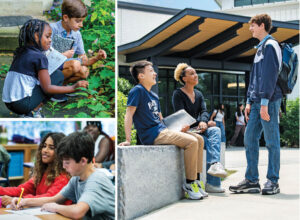This is the third of three articles this year that takes a deeper look into Abington Friends School’s envisioning of the Fourth Century of Friends Education. The Fourth Century Center addresses how schools must evolve to reflect the nature of childhood and adolescence in today’s world and how a Quaker education has the great potential to be a force for positive social change.
What is the Role of Student Choice in Education?
Since my arrival at Abington Friends School in August, I have been struck by the amount of room built into AFS structures and schedules to allow students to make choices about their own educational paths and their engagement in community life. Students across age levels are given opportunities to shape the content of what and how they learn.
- In Lower School mini courses, third and fourth grade student input was used to develop a menu of course options. From this menu, students chose areas of interest to explore for eight sessions. Students learned in small groups of cross-grade peers, working with industry experts.
- In Middle School, students chose which careers interested them during the STEM career fair. Guided by the 8th grade team, students pursued individual passion projects for EGIS (Eighth Grade Independent Study), which culminated in an evening that celebrated learning based on individual interests.
- In Upper School, students have the option to participate in Career Explorations programs (“Ex Programs”). Yet, not only expected to participate, students are currently providing their input into the design of the 2023-2024 program. At the same time, our seniors are engaging in Capstone projects: deep exploration over the course of a month when they use their time as they choose.
This celebration of student choice is not just about encouraging children to make their own decisions; it is about empowering them to own their successes. When we give students space and time to follow their passions, we provide them with the opportunity to experience the unique and all-too-important sense of accomplishment. As Adam Gopnik wrote in a May article in the New York Times, “Accomplishment is the end point of an engulfing activity we’ve chosen, whose reward is the sudden rush of fulfillment, the sense of happiness that rises uniquely from absorption in a thing outside ourselves.” By prioritizing student choice, we show children that challenge and struggle, when coupled with passion, results in the fulfillment of accomplishment.
Cultivating the Sense of Accomplishment
Within our work in experiential learning, choice is intentionally woven throughout the arc of a student’s time at AFS. When adults celebrate student choices and student accomplishment, students see their ideas and passions are valued. We show that we see our students as whole people, acknowledging their lives outside of academics. We empower our students to change our community in ways that we adults could have never imagined.
But valuing student choice at AFS stretches far beyond the world of experiential learning. Students choose from an array of electives across disciplines of their choosing, have flexibility in how they demonstrate their learning during assessments, create and run clubs based on their own interests, and produce unimaginably inventive events for the entire community. And, while choice provides for opportunities for students to engage more holistically in their education, we are also preparing them to advocate for themselves, to use their voices, and to make decisions in a world with a seemingly endless bounty of options.
The Fourth Century Center at AFS
The Fourth Century Center has a role to play in ensuring our students have the resources to make choices that impact their experiential learning journeys. As laid out in our 2022–2027 Strategic Plan, the Fourth Century Center will be a “multidisciplinary center of learning and innovation that will richly support the lives of teachers as educators and program designers and fuel our thinking for transformative education.” Over the next three years, we will work had to ensure that faculty are provided resources and time to research and apply how to integrate experiential learning into their classrooms. We will also continue to offer varied and dynamic experiential opportunities for students, to help them deepen and broaden their understanding while building networks and engaging in authentic and meaningful work.
Adena Dershowitz is the Director of the Center for Experiential Learning at Abington Friends School. In her role, she focuses on providing resources and organization for faculty and students to add authenticity, creativity, and purpose to the student experience across all divisions at AFS.


